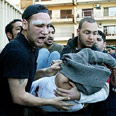
With the increased armament, there was growing concern over the eruption of a civil war, like the one that ravaged Lebanon from 1975 to 1990.
“There is a reappearance of arms in the hands of almost every political group; we are sitting on a powder keg, tension is increasing every day," the newspaper quoted a prominent security analyst.
"They don't know what they are doing. They are going to destroy this country," he said.
The political upheaval in Lebanon started roughly two months ago, after Shiite ministers affiliated with Hizbullah and Amal quit the government upon Prime Minister Fuad Siniora’s refusal to grant them one-third representation in the Cabinet.
This sparked mass demonstrations against the government, which spiraled into riots and street violence.
According to a report in a Lebanese newspaper, the country has become overrun with illegal arms dealers, selling a reported 10-15 weapons daily – in a country of four million residents. Some weapons have been bought in bulk by elements linked to key political factions, the report said.
As the two-month anniversary of the assassination of former Lebanese Prime Minister Rafik al-Hariri approached, tensions were steadily rising. On the day of the anniversary, supporters of the government have planned to demonstrate opposite a tent city set up by the Opposition camp some eight weeks ago.
"Lebanon's Sunni bloc, led by the Hariri clan and their regional Arab allies, has sent a number of fighters to Jordan, Saudi Arabia and Egypt to receive military training to counter Hizbullah's well-equipped and well-trained military forces," The Guardian quoted a December report by private intelligence company Stratfor.
Stability was shaken up after a large cache of weapons and training equipment was seized from a Christian militia. The raid was simultaneous to reports from US intelligence analysts that members of state’s prominent Sunni party were loyal to other countries and were receiving training abroad.















